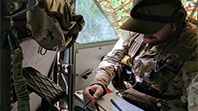OceanBonfire
Sr. Member
- Reaction score
- 392
- Points
- 1,080

As information technologies advance so does the Battle Space. The rapid pace of innovation increases the need for Light Electronic Warfare Team (LEWT) to adapt, and overcome these ever-changing technological advancements. Electronic Warfare (EW) is one of several disciplines combined to support the greater systems of Information Operations (IO). EW is used to monitor or deny the adversary use of the Electromagnetic (EM) Spectrum allowing us to gain better battlefield awareness and disruption of their communication at critical points in time. As members of the LEWT we are trained with flexibility and resilience in mind to meet the ever-changing needs of the Battle Space.
LEWT operators use highly sophisticated equipment and must be able to operate in austere conditions. The LEWT enables various combat effects by adding collection, processing information, analyzing and reporting on EM activities to the intelligence cycle. Operators need to extrapolate information in order to solve technical problems as they arise and ensure collection and processing of the information is accurate.
We receive training from a multitude of sources. In addition to the EW courses and equipment-specific training, the United States Marine Corps trains us in their Radio Reconnaissance Operator. Many LEWTs have also participated in training with Australia, the United Kingdom and New Zealand. These training opportunities are conducted to improve capabilities of all nations involved by sharing experiences. Other courses within our own forces include the Basic Parachutist and Basic Reconnaissance courses. Continuous training as a LEWT is indispensable. When we are not conducting online research to enhance our operator knowledge, we are engaged in a persistent physical training regimen. Training includes ruck marches, amphibious training and calisthenics; on top of the usual running and circuits.
The LEWT works in small teams usually consisting of three to five members, including members of the Regular and Reserve Force. Each member in the team have their individual responsibilities, but we are expected to be proficient at all tasks integral to the LEWT. Employment of a LEWT and the understanding of how teams are employed is just as important as knowing what we do. As LEWT, we are often attached with Operational Control (OPCON) under a reconnaissance or sniper element. In some cases, we are employed to enhance force protection by providing indicators and warnings to the supported element, such as if the adversary is about to make a strategic move based on changes in their patterns of life within the EM spectrum.
This job is highly demanding, but soldiers who take the challenge and become part of a Light Electronic Warfare Team take great pride in their job. We work closely with all branches of the CAF and must continuously adapt our training to meet mission specific requirements. The LEWT is one of the unique capabilities at 21 Electronic Warfare Regiment in Kingston, a unit within 6 Canadian Combat Support Brigade, and 5th Canadian Division of the Canadian Army.
Inveni et usurpa! Find and Exploit!

Light Electronic Warfare Teams, Who and What are We?
The rapid pace of innovation increases the need for Light Electronic Warfare Team (LEWT) to adapt, and overcome these ever-changing technological advancements.



